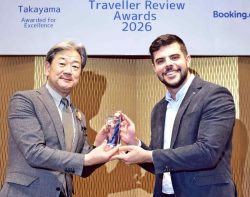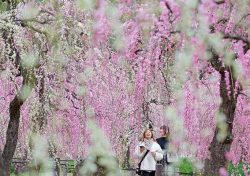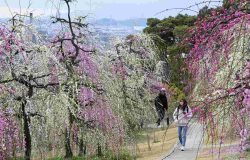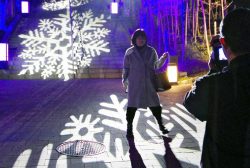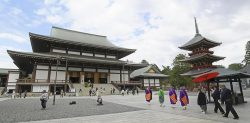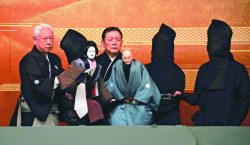Ehime: Dogo Onsen Honkan to Raise Bathing Fees in Effort to Preserve Treasure of Matsuyama
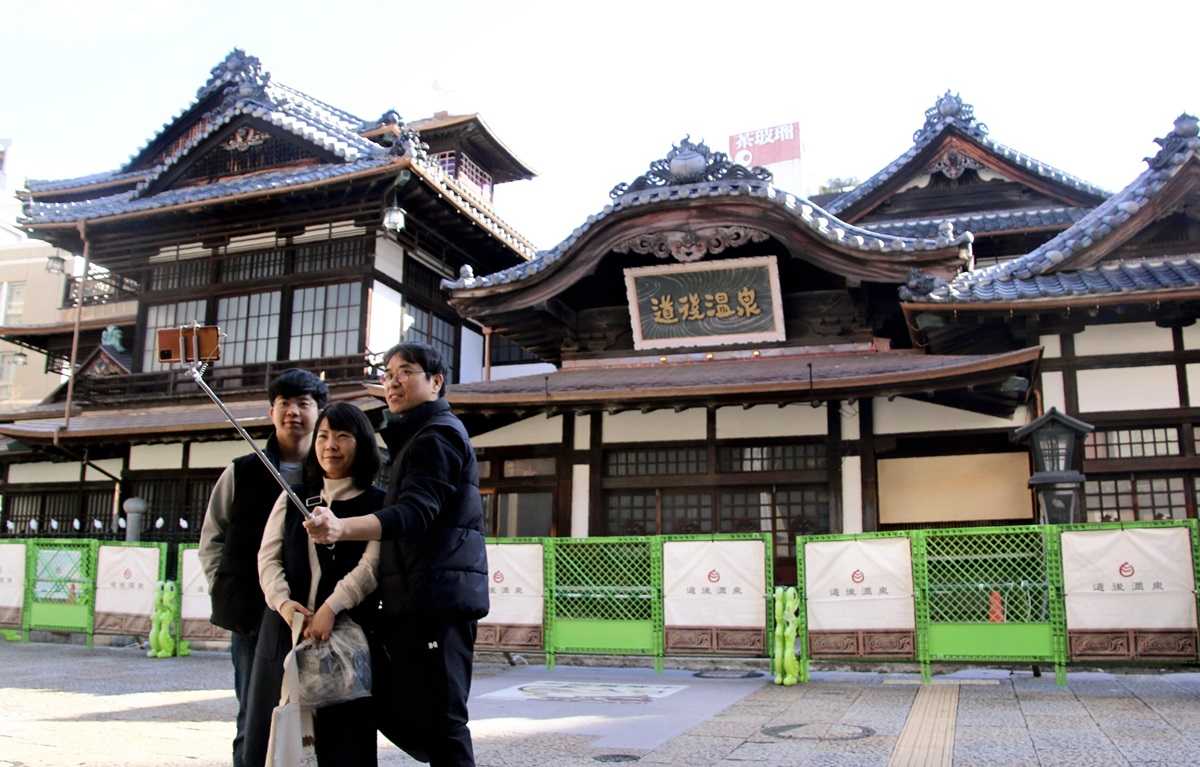
Fences are put up in front of Dogo Onsen Honkan in Matsuyama, which has been a popular photo-shooting spot for tourists.
15:12 JST, March 23, 2024
MATSUYAMA — Dogo Onsen, a popular bathhouse in Matsuyama which is said to be the oldest hot spring resort in Japan, will raise its bathing fees this summer.
Excluding special occasions such as the consumption tax hike, this is the first price increase in 19 years.
Dogo Onsen Honkan, the city’s most famous tourist attraction, has run into the red due to conservation and repair work as well as a sharp drop of visitors resulting from the COVID-19 pandemic. The Honkan, meaning main building, will fully resume operation on July 11, when the work is finished. The fee will be raised from ¥460 to ¥700 for adults. Officials say this is intended to conserve the “treasure of Matsuyama.”
The city-run bathhouse is characterized by the purity of its hot spring water, which it does not heat or dilute. The Dogo hot spring resort has 18 source springs, from which hot water of varied temperatures is collected at four facilities called buntojo. There, special employees blend and adjust the water to keep it at a constant temperature.
The facilities which could be called the heart of the resort are monitored 24 hours a day in shifts by five specialists. They adjust the mixing ratio of springs of various sources depending on the season and temperature, so that the water remains at about 42 C in the bathtub. The water is then sent to the Honkan, inns and hotels in the resort.
This is why labor costs and expenses for updating facilities are higher than those of other hot spring resorts.
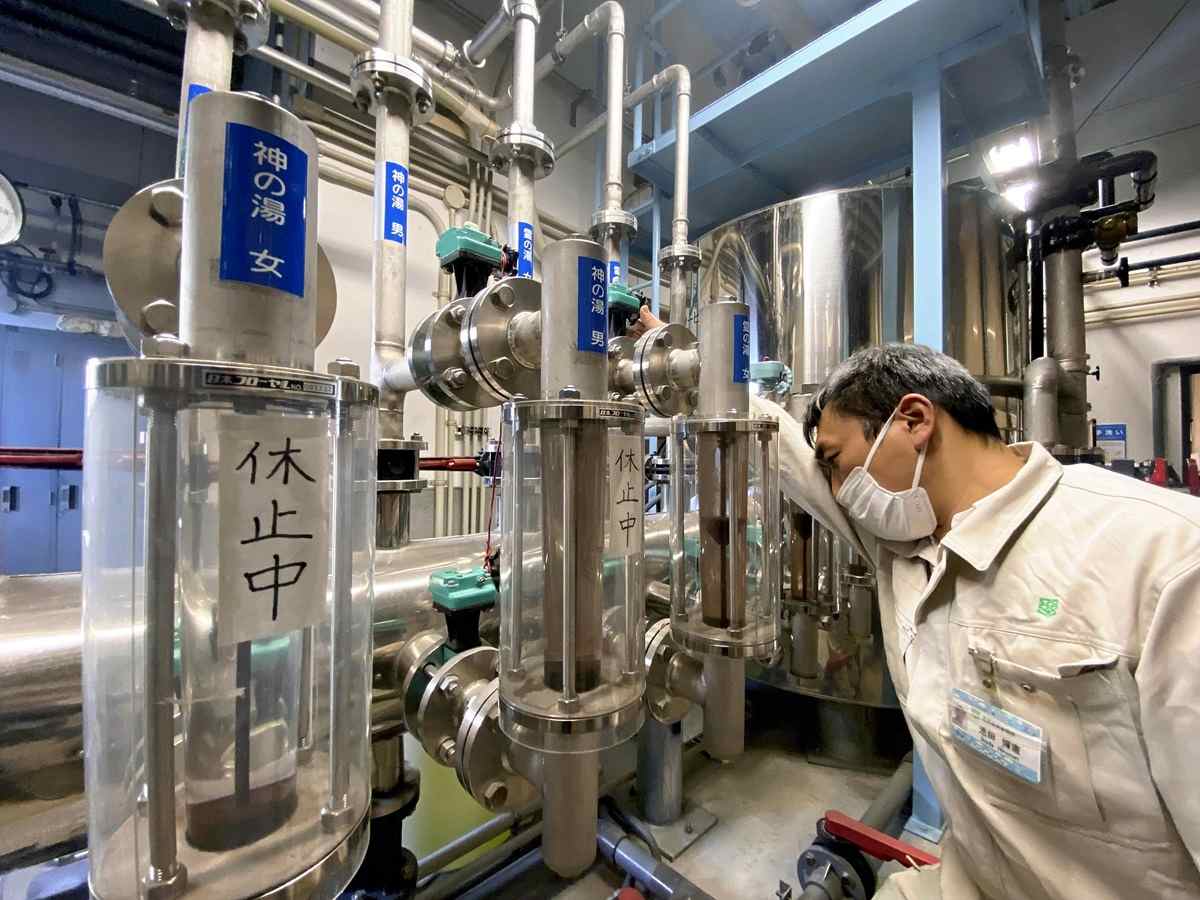
A special employee takes care of the hot water from 18 source springs to send water at an appropriate temperature to Dogo Onsen Honkan in Matsuyama.
The decline in the number of visitors was triggered by the ongoing large-scale conservation and repair work, which began in January 2019 to cope with the building’s age and insufficient resistance to earthquakes.
The bathhouse used to attract about 800,000 annual visitors through fiscal 2017. But after the conservation work forced a restriction of operations, such as opening only one of the two bathing room types and suspending the use of its lounge, the number of visitors dropped to 110,000 in fiscal 2021.
Dogo Onsen Honkan’s status as a designated national important cultural property is one factor that has prolonged conservation work. For example, more than 20,000 of its roof tiles had to be individually examined. Additionally, the bathhouse was forced to close for a total of 157 days in fiscal 2020 and 2021 due to the pandemic.
Due to such factors, the city’s special account to cover the bathhouse’s operating expenses ran into the red. Since then, the deficit has been covered by the general account, and the amount needed to cover the special account’s deficit totaled ¥216 million in fiscal 2021.
The city government estimates that the facility will continue to have between ¥60 million and ¥170 million of annual deficit if bathing fees are kept at their current level because the number of visitors is unlikely to increase due to population decline. A revised ordinance to raise the bathing fees was enacted at a city assembly meeting in December.
The bathhouse will also improve its facilities and services, such as opening two new reservable lounges and installing air conditioners in changing rooms.
The city government estimates that the facility will continue to have between ¥60 million and ¥170 million of annual deficit if bathing fees are kept at their current level because the number of visitors is unlikely to increase due to population decline. A revised ordinance to raise the bathing fees was enacted at a city assembly meeting in December.
The bathhouse will improve its facilities and services, such as opening two new reservable lounges and installing air conditioners in changing rooms.

“The Dogo Onsen Honkan is our city’s treasure,” said an official of the city government. “We hope to continue the facility’s sound management to protect its history and culture.”
“Dogo Onsen could have raised bathing fees earlier,” said Tomohiko Takayanagi, a lecturer at Hitotsubashi University, who studies the economic history of hot spring resorts. “I hope those concerned will continue steady efforts to promote the history and culture of the hot spring and come up with measures to make it even more beloved among its users.”
Related Tags
Top Articles in Features
-

Tokyo’s New Record-Breaking Fountain Named ‘Tokyo Aqua Symphony’
-

Sapporo Snow Festival Opens with 210 Snow and Ice Sculptures at 3 Venues in Hokkaido, Features Huge Dogu
-

High-Hydration Bread on the Rise, Seeing Increase in Specialty Shops, Recipe Searches
-

Heirs to Kyoto Talent: Craftsman Works to Keep Tradition of ‘Kinran’ Brocade Alive Through Initiatives, New Creations
-

Maltese Pavilion’s Famous Ftira Bread Now Available in Osaka; Loaves Became Popular during 2025 Osaka-Kansai Expo
JN ACCESS RANKING
-

Producer Behind Pop Group XG Arrested for Cocaine Possession
-

Japan PM Takaichi’s Cabinet Resigns en Masse
-

Man Infected with Measles Reportedly Dined at Restaurant in Tokyo Station
-

Israeli Ambassador to Japan Speaks about Japan’s Role in the Reconstruction of Gaza
-

Videos Plagiarized, Reposted with False Subtitles Claiming ‘Ryukyu Belongs to China’; Anti-China False Information Also Posted in Japan


